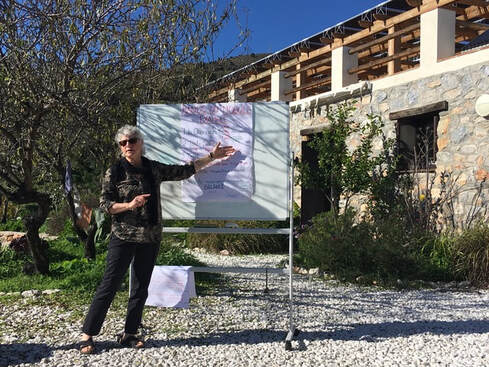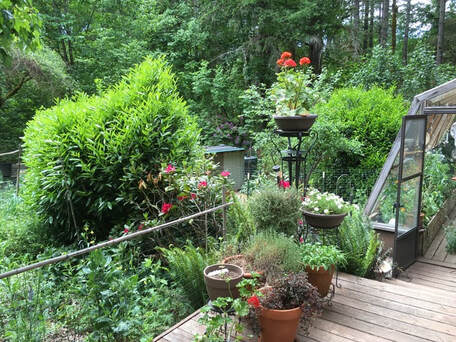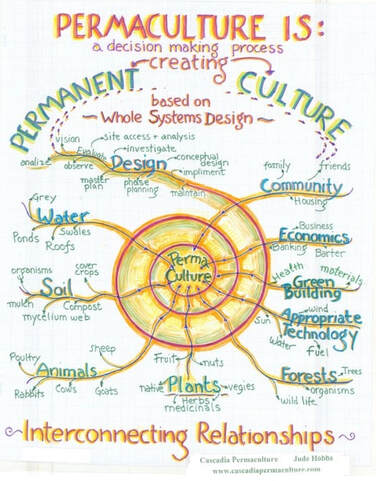Cascadia Permaculture Institute & The Permaculture Institute of North America

For those of you working in – or passionate about – the subject, you have inevitably been asked “what does permaculture mean?” When defining the term, eyes might gloss over as you struggle to portray the importance embedded within. As a Sustainable Communities professor, I have seen the value in clearly articulating what I mean by the often-used term ‘sustainability.’ Similarly, as an internationally respected permaculture teacher, Jude Hobbs emphasizes the importance of clearly relaying what permaculture means.
When asked to define the term in our interview, Jude, co-founder of the Permaculture Institute of North America (PINA) and Cascadia Permaculture Institute (CPI), clearly and confidently says permaculture is “a new buzzword for an old way of being.” We could stop there, or if the inquirer is curious, then expand further with “Think about how your ancestors lived – they purchased things local and they worked within their community. They didn’t waste resources as much – everything was precious. Water was precious, wood was precious…Talk from where they are comfortable and then expand out from there.” Another way she defines permaculture, as I do with sustainability, is “it’s a whole systems way of thinking.” Jude clarifies “I’m not using resilience, I’m not using regeneration, I’m not using harmonious relationships. I’m not using any of those words.” Instead, the focus is on a tangible, sixth-grade-level understanding of what is becoming a widely used (sometimes misused) and interpreted term…just as with sustainability. It’s not an issue with the word, it’s the struggle with a clear definition. In our interview, Jude rhetorically asks “What other word describes this system? Sustainability? Yeah, true sustainability. People say ‘oh, I don’t want to use the word sustainability. It’s greenwashed. But if you define that to what it is truly meant to be, that’s what permaculture is.” It’s true, when we analyze the intention and meaning of sustainable living, the three pillars often referenced – environmental protection, social responsibility, and financial justice – with the intention of creating a better life for future generations can be interchangeable with the three main ethics of permaculture.
Jude was trained as mental health professional, but in 1979 her career underwent a much-needed turn through taking a master gardener class. After then working as a program developer with master gardeners, she moved into traditional landscaping. A course on edible landscaping in 1984 further shifted her direction. Then, in 1985, she was invited to learn about permaculture on Whidbey Island at a 5-day workshop and fell in love. In her words, “I’m a whole systems thinker by nature. Mollison used to tell this story that he did all this research, with Holmgren as his apprentice, seeing what worked and didn’t work. Then he went on to public radio and was talking about the [permaculture design system], and he gave his address out. As his story is told, he says that within a week, 5,000 people wrote him and they all said the same thing…‘you expressed what I have been thinking about and have given me a way to act.’ And that’s what is so unique about permaculture to me. As a systems thinker and how to encapsulate all of these elements, those principles and ethics give you the toolbox of how to make change.”
 Since her first exposure to permaculture, Jude has been practicing on various landscapes and teaching both the traditional Permaculture Design Certificate (PDC) and more advanced courses. Around 2000, Jude started offering teacher trainings “guiding people to have the confidence to talk about this.” She has found her niche and passion in teaching teachers, which she does through her business of Cascadia Permaculture and her Advanced Permaculture Course in Teaching, which counts towards the PINA permaculture diploma (an advanced certification level beyond the PDC).
Since her first exposure to permaculture, Jude has been practicing on various landscapes and teaching both the traditional Permaculture Design Certificate (PDC) and more advanced courses. Around 2000, Jude started offering teacher trainings “guiding people to have the confidence to talk about this.” She has found her niche and passion in teaching teachers, which she does through her business of Cascadia Permaculture and her Advanced Permaculture Course in Teaching, which counts towards the PINA permaculture diploma (an advanced certification level beyond the PDC).
As with language, ethics are critical to Jude. In co-founding PINA, Jude helped create an option for professional development for PDC graduates. She mentions how some refer to her strong focus on credibility and ethics as a sort of “permi-police.” Jude is passionate about credibility as “My ethical stance is very strong. Ethically, that 72-hour curriculum with Mollison doesn’t include hands-on, doesn’t include field trips. That is 72 hours of lecture and if you have ever seen him, that’s what he did. He told stories and talks and wrote on the board. And he was magic because he could tell great stories. My courses were 92 hours so we could do all these different things. I’ve come to balance that out a little bit because I think that field trips and hands on, well-done, are an integral part of the educational process. But there are people who offer 8-day courses and they give certificates. And so that’s where we are saying ‘no’, that doesn’t work for us…What we care about is the integrity of the movement and of what is being shared as knowledge learned. So that is why I invested my hours in PINA.” And she is still serving as an advisor despite her other responsibilities.
In addition to running Cascadia Permaculture, Jude also works with a nonprofit called Salmon Safe through her Agro-Ecology Northwest business. In this role, she is helping farmers and ranchers to assess management practices for water quality. This is lessening the toxic chemistries applied to the land and making their way to waterways and to increase biodiversity. “I’m really familiar with conventional agriculture, even as a rabid organic follower, just because that’s where I feel the change needs to go.” In her spare time, Jude also sells at the farmers market or trades produce from her homestead in Cottage Grove, Oregon, called Wilson Creek Gardens and she is writing a book about multifunctional hedgerows.
Going back to her advanced teaching courses, Jude reflects “my goal is to change the educational paradigm one person at a time.” She describes her teaching as interactive, both in the classroom setup and in the content. This interactivity is accomplished in asking herself “How do you create wonder and awe in the classroom setting for adults or children? That’s the premise I would like to move forward with in education.”
In teaching teachers, Jude is “very interested in working with people who are professional because I feel like permaculture has suffered from the hippy syndrome and that’s why I wanted to teach at the university.” We aren’t just talking traditional teachers either as less than 5 percent of the participants in her classes are traditional teachers. Participants range in nature from farmers looking for tools to teach their interns to librarians. Jude sees in this older group of people who are proactive learners more of a mission they want to accomplish in life. In regards to that mission, “My goal is giving them a way to act. How are they going to take what they’ve learned and utilize it? I’m not there to just entertain them – edutainment – I want them to make change and that’s what is so fun about doing the advanced courses is they will write me…with examples of how they have utilized what they have learned”. In regards to doing this as her career, “It’s a passion that can be set to reality and that I can make my living at it because I’m really FOCUSED ON right livelihood. Every time I teach, especially when I was doing PDCs, every single module we taught covered how can you make a living doing this. It doesn’t have to be la-la-land.”
And unfortunately, many see permaculture as an idealistic ‘la-la-land.’ Thus, “The more professional that we are, the more the mainstream will embrace the concepts.” This hits home for me in working within academia. Jude also points out that “If we hold our stance of integrity then it will pass the test of time. I tell all of my students, if we do have collapse, you are going to be the ones people call. You are going to be so busy you’ll be grateful you have followed this path.”
To discover more about Jude, Cascadia Permaculture, and the Permaculture Institute of North America, visit: https://cascadiapermaculture.com/ and https://pina.in/

Recent Posts

